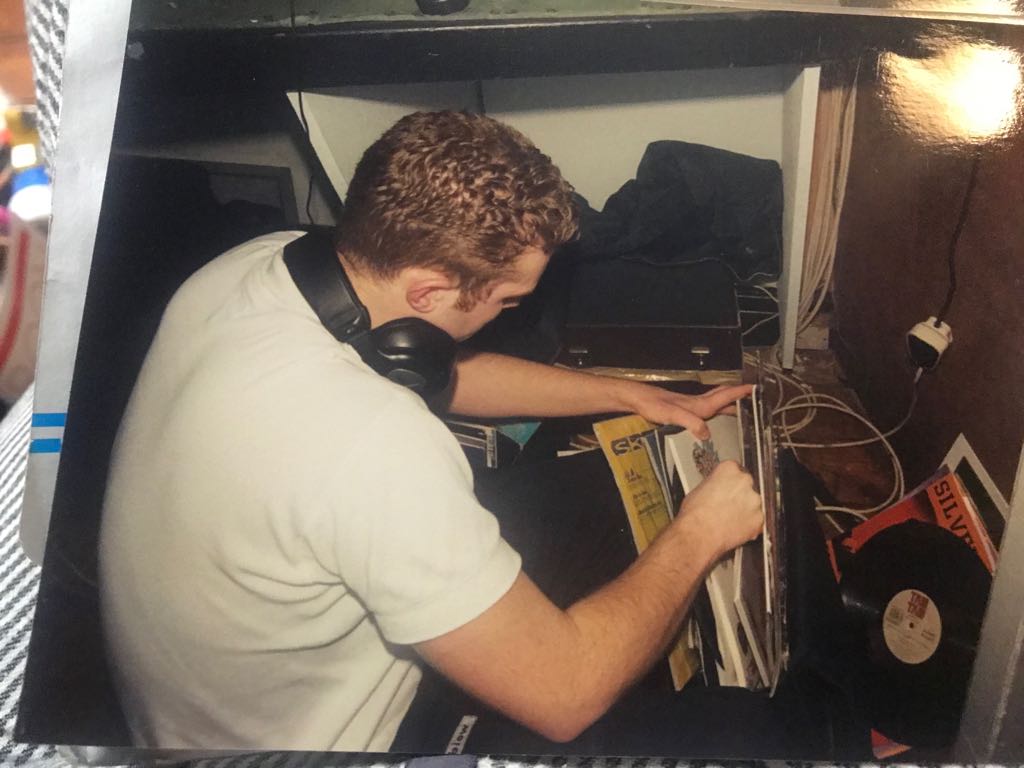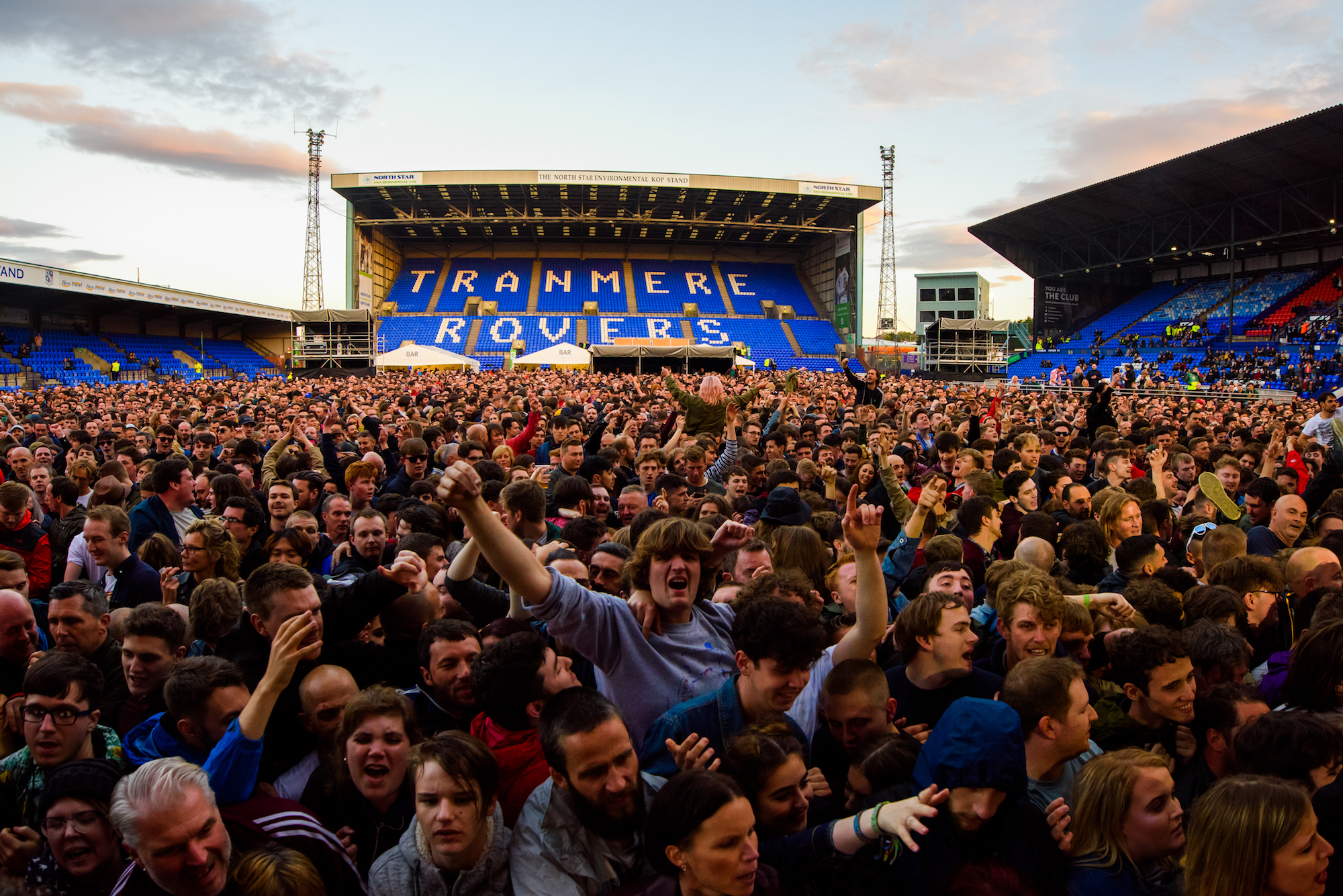On a Saturday in May last year, Liverpudlian Emile Coleman watched from behind the scenes as the later-ubiquitous “ohhh Jeremy Corbyn” chant rippled through a crowd for the first time. You know the story by now: Football fans did that thing football fans constantly do, and set a name to the tune of the White Stripes’ “Seven Nation Army” guitar riff while punching the air with their fists/clapping along/stamping etc. But Emile, who you’ve probably never heard of, stood particularly close to that moment in Tranmere Rovers Stadium because he orchestrated it. He produced last year’s Wirral Live festival, where Corbyn appeared onstage during a weekend that saw performances by The Coral, The Libertines and Little Mix.
Sitting with me in east London, Emile remembers Corbyn’s reaction at the time. “He couldn’t hear what the people in the crowd were saying. He could hear them shouting, but not what they were actually saying.” Then, Corbyn heard the chant. “Nobody knew how pivotal that moment was and how it came to define the run-up to that election – a crazy campaign as it was,” Emile says now, chuckling to himself. He’s perched on a sofa at the VICE office in February, wearing jeans, black Nikes and with tattoos that snake along his arms under the sleeves of his navy Kith tee. He’s imparting this story because he has another one to share: he’s about to go from programming Corbyn and a bunch of old indie to putting on JME, Tiffany Calver and Metro Boomin at his May Weekender festival in Merseyside this year (Migos were an early hope, but aren’t on the lineup now).
Videos by VICE
When he calls me the day before we meet, I point out what a leap that represents in both genre and demographic. But when I come to understand Emile’s own batshit backstory, jumping from Reverend and the Makers to Lotto Boyzz makes total sense in his world. At 40 years old, he’s worked as many jobs as a slash-career millennial, from nightlife to teaching to being CEO of a sports technology company. It all started with Totem, the Liverpool rave he started as a 16-year-old, which ran for about a year and a half until it was closed down. “To this day, I have people – who must be pushing 50! – asking me to bring it back,” he says, laughing. “It was Sodom and Gomorrah, honestly. I still see people who’ve never quite recovered from it. They’ve probably lost some of their faculties from all the drugs people were doing a the time.”

Now, Emile (who’s never bothered with drugs or booze) is a talker. He is the kind of person who makes you want to say cliche shit like: ‘the guy can spin a yarn!!’ and I can tell he’s addressed a crowd plenty of times before. His tangents zip from a story about a bulletproof vest his students saw the police pull out of his car to tales of juggling producing plays with being a single parent. Through it all, it becomes clear that he’s the thread somehow connecting “ohhh Jeremy Corbyn” and JME.
Noisey: I want to trace the arc of this story, of the jump from Corbyn and The Coral to Migos, back to your origins a bit.
Emile Coleman: I’m nearly 40, but I grew up as a white kid in Toxteth in the 1980s, which was an area of deprivation and massive racial and sociopolitical segregation, not long after the riots. Music underpinned everything. We didn’t have nightclubs to go to, because the city was so racist. We didn’t have anything like that [he scoffs, catching himself]. And you notice that I say ‘we’ but that’s because I grew up in a community like that. And everyone was together. Going outside that community was very different, though I traversed both sides of the city because of my family.
Yeah, you mentioned that your mother worked as an activist for years. How much did that factor into you going from that upbringing to working with kids?
When I went to teach, part of what I wanted to do with my students was something ‘real.’ We wanted to put on something to do with grime – or bassline, as we called it at the time. Back then, the police would shut you down in Liverpool instantly, no one would allow it. So you had kids of 10 to 16, all making beats, with nowhere to go. So I fronted the money for us to put some of them on for a night, via the college at the time.
How long ago was that?
This was probably ten years ago. We had Chipmunk when he was a kid, loads of people came through it. We were laughing cos we had Skepta locked in for a grand and it didn’t happen, but we produced this night anyway that was a safe environment. I got friends of mine from Toxteth who’d… who’d lived a different kind of life to come in and do security. Fast forward to ten years later, and I get called into do Wirral Live, which musically wasn’t my thing in any way. But it was an event, and that’s essentially what I can do very easily.

Talk me through making that jump from Wirral Live to the May Weekender lineup though.
Well, I was with my son in the media box at Wirral Live. He’s looking out over everything and turns to me like, ‘Dad, dad – you’ve got to book Migos next year. You’ve got to book Migos.’ And I’m like, ‘Yeah, I’m not doing it; I’m retired.’ ‘No no no, you’ve got to book Migos. Just email them and see what the score is.’ He’d found an email on their Instagram, so handed it over. We got in touch, got nothing back, and nothing was really happening.
But Wirral football club was owned by the ex-chairman of the English FA, Mark Palios – fantastic guy. They did that concert, then wanted to do another and gave me free rein to do that. And I thought, ‘how do we reflect the locality of the area while doing something different?’ For example, I’ve just come from talking to Giggs’ agent, Bugzy Malone’s agent, we’re trying to lock in Cardi B. We’re on the back and forth with Migos; we’re talking to everyone.
This sounds like a return to your time putting on raves as a teenager.
Yeah, I would’ve been 16 when I essentially ran this rave club called Totem. It was… just craziness. A thousand-plus people in this Georgian build in Liverpool’s Irish centre, which is just derelict now. It just went off. This would’ve been post-poll tax, when the police were always trying to shut raves down; it was politically a very sensitive time. And the people who’d come weren’t your ‘normal’ people; they’d be the sort to fight for change, you know? But they’d go and rave.
Then how did that all end?
I saw the shift coming, with the economy. You could feel it; the city was changing. Cocaine changed a lot of stuff, massively – that shift from the ecstasy generation to cocaine and alcohol was very difficult. It was drawn out, it wasn’t very nice. In a city like Liverpool, it felt even worse.
So is this when you got into cage fighting?
Yeah [laughs] I reached a point where I was soul-searching, thinking about the clubbing stuff. And, after speaking to my partner – my son’s mum – I just walked away from it. And clubs just went [he motions a graph curve plummeting] psssh, like that. I made the right decision, then got into the cage fighting, owning the organisation that promoted and produced the events.
It’s funny how whether you’re talking about cage fighting or teen raves, you’ve still got the same excitement in your eyes. How did that translate with Wirral Live? Who called you to get involved?
Mark Palios himself, who’d bought the football club, because we were friends. I didn’t have a formal role with the club, it’s hard to describe. But I helped them out here and there. I knew they were doing this concert, and I’d said, ‘be careful.’
When did the call come in, exactly?
About five weeks out, before the event. It was laaaate. It was hard. I’ve done some hard events, which make you think ‘how can you get through that?’ but this one was testing, to say the least. So Mark called and said ‘can you look at it?’ and I was like ‘ooh, you’ve got a problem here.’
What did he bring to you that looked a mess?
A spreadsheet.
Of who was booked?
The thing that made me go, ‘ohhh no’ was the graph of the ticket sales. If you’ve ever promoted anything, you know about your peaks and troughs. You know how that goes. But I just saw a graph that went like that [he motions a full downwards slope at about a 45-degree angle]. I couldn’t even point out what had worked at a particular peak or what had caused a trough.

How did Corbyn come into it, though?
I was on holiday with my family, planning all this from beside a pool. We were having breakfast and I was thinking about the screens. And I said, ‘Mum, what about voter registration? Speak to Labour, give them a call.’ So she calls Corbyn’s office – she’d introduced him when he was getting ready to speak at the Labour Party Conference. There was a bit of back and forth about a fee, but we got there. Then the shit hit the fan when I was talking to artist management – ‘why are you mixing music and politics?’ and all that.
That argument is exhausting – music and politics are constantly interwoven, in my opinion. How did you get past that?
It was non-stop for a few days, working 20 hours a day at one point. Then, at the end of the week, I got an email from Labour and one from Pete Doherty’s management. And Pete was totally up for getting on stage with Corbyn; we knew the Libertines were in Liverpool the next day. So I thought, ‘let’s roll.’ It gets out, as things go – people leak things. People are going ‘Jeremy Corbyn’s coming the night the Libertines are playing,’ next thing I’ve got the Met Police on the phone to work out the logistics of that. He can’t go on stage with the Libertines for various reasons, The Coral were going to do it, then one member of The Coral didn’t want to. So I’ve got Corbyn on the way and I grab Jon McClure from Reverend and the Makers and ask him to introduce Corbyn – and to go on a bit late, because Corbyn’s still coming.
With this year, do you envision a totally different crowd coming? That’ll feel like a world apart from what’s happened in that space before, surely.
[laughs] Oh yeah. There’s a real irony as well, because the Tranmere Rovers supporters are called the Super White Army. And there’s signs all around the stadium saying that, but they’ve always had a rep for being an anti-fascist club throughout the 70s, 80s – they still are. They’re good people. But the irony of it is fucking great. It’s going to be a load of madness. There’s no ‘what ifs.’ It’s like: we’re going to do a festival. We’re going to do it with these artists; we’re going to make it work.
This interview has been condensed for length and clarity but please know that the raw edit was fire. May Weekender is on from 25 to 27 May and tickets are going here.
You can find Tshepo on Twitter.
More
From VICE
-

Screenshot: NetEase Games -

Kara Durrette/Getty Images -

Jun Sato/WireImage/Getty Images -

Laura Hedien/Getty Images
